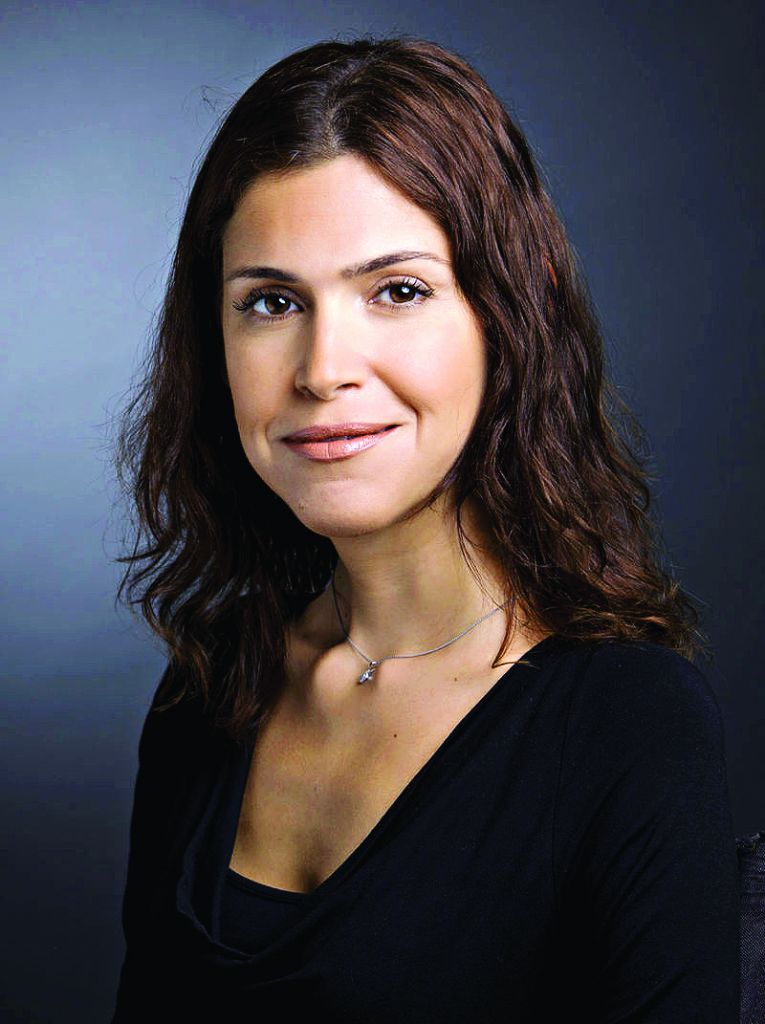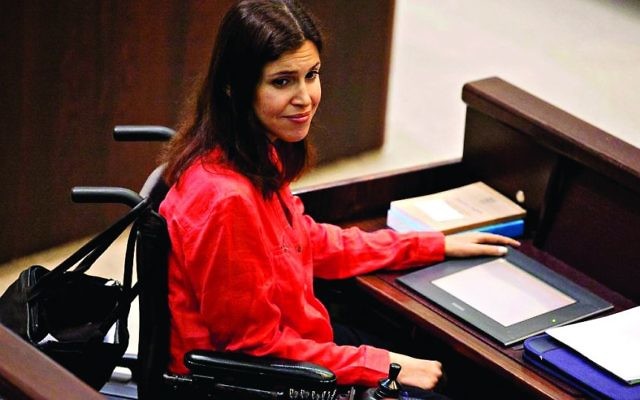The wheelchair warrior fighting for the disabled
Karin Elharrar has some revolutionary ideas about special needs education in Israel and is not afraid to shout about them, as she tells Stephen Oryszczuk
Get rid of them. Get rid of Israel’s special needs schools. All of them. And don’t build any new ones, no matter how good or how specialised. That’s the immediate and unapologetic answer from wheelchair-bound Israeli parliamentarian Karin Elharrar when asked what she’d do if she were Israeli prime minister for a day.
Why? Why would this champion of rights for the disabled want to rid Israel’s disabled children of their specialist support structure? Has this 38-year old lawyer-turned-politician with muscular dystrophy gone mad?
A meeting in London this month reveals she is far from it. Instead, Elharrar is on a mission to revolutionise special needs education by integrating Israel’s less able children into the country’s mainstream school system. It is an aim supported actively by the Malki Foundation, which helps families of Israeli children with special needs.
“There are 65,000 severely disabled children in Israel,” says Debbie Fishman, Malki’s head honcho. “They need to live with honour and dignity, not get shoved into an institution, which is what gets done in Israel a lot.”
Shoved into an institution? “They’re not units in a mainstream school, they’re separate institutions, in the corner of a city, off to one side,” Elharrar explains. “It’s out of sight, out of mind,” Fishman echoes.
 “Israel’s is an old way of thinking,” agrees Malki Foundation UK chief James Harari. “It’s a case of put them together, get them out of the way, in the middle of nowhere, and get on with your life.”
“Israel’s is an old way of thinking,” agrees Malki Foundation UK chief James Harari. “It’s a case of put them together, get them out of the way, in the middle of nowhere, and get on with your life.”
This all sounds very different from Britain’s more integrated society, but can institutions dedicated to meeting the needs of disabled children be such a bad thing? Headteachers of mainstream Israeli schools recommend them to parents “with some reason,” Elharrar admits. “They say they’ll find all the therapists needed in one setting. But we can do it better another way, by bringing the therapy to the general schools.”
Currently, the state pays NIS 1,500 per week for Israel’s disabled children to attend these institutions, but this is akin to “babysitting,” Harari says. In addition, the state pays for one session of therapy per week, plus carers and shuttle buses but, Fishman argues: “It’s not enough. These are children who need one session per day, not one per week. They need individual plans. That’s where we try to help.”
Why, if the state pays for the basic support needed, is it so important to integrate disabled and mainstream kids? Elharrar says research shows integration is needed from an early age, four or five, “to lead the child to be more independent, more able to integrate in labour, but this isn’t happening,” and the effects are evidenced by those who emerge from the institutions aged 21, unable to socialise or to work.
“They’re just left, neglected. Most don’t have friends. We have this ‘not in my backyard’ mentality in Israel. People are not even ashamed to admit it. They don’t want people with disabilities near, because the value of the neighbourhood would go down.”
Elharrar, once a lawyer who worked on disability cases and now Knesset Member for Yesh Atid, says she could walk until she was 20, so wasn’t cast off as others are. These days, she admits to being “the annoying one who always gives speeches on the same subject,” but that’s fine – it’s why she entered politics.
There have been small successes, too. She managed to push through a law before summer recess dictating that all Israeli firms should recruit a percentage of disabled staff, but says the government would not agree to incentives, and “political compromise” meant the penalty for non compliance was “only symbolic”.
Is this symptomatic of a poor Israeli attitude towards the disabled? “No one will tell you it’s not important,” she says with a diplomatic sigh. “But when it comes to voting, to budgets, there are always other priorities.” Did Israel’s three bronze medals in the Paralympics not help? “The Olympics was a big festival in Israel, with all-day broadcasts, but the Paralympics had an hour, usually on an abandoned channel.”
Cultural or not, the obstacles are well known, they say. The quality of care, for which municipalities are partly responsible, “differs greatly between cities”. Special needs assistants are demotivated by “lousy pay and lots of responsibility”. Parents “have to fight for what they need”. Mainstream school teachers say they are “not trained” to teach children with special needs. Charities say co-ordination is “disorganised”. Problems abound.
Yet there are isolated examples of good practice. Aleh Negev, a special needs institution in the south, pioneered a model in which free dorms on-site entice mainstream students who then help out on campus, and in so doing mix with disabled children. In the world of work, the Aroma coffee chain is to employ someone with learning difficulties in every branch.
Could it change? Revolutions rarely happen without a nudge. In Israel, that prod will likely be traced back to Elharrar, who will go on campaigning as long as she’s able. “Integration is an understandable fear, but this is a society with a variety of people, in a variety of situations, and whatever we do, people with disabilities are here to stay,” she says. “You can’t pretend forever they are not here.”

Thank you for helping to make Jewish News the leading source of news and opinion for the UK Jewish community. Today we're asking for your invaluable help to continue putting our community first in everything we do.
For as little as £5 a month you can help sustain the vital work we do in celebrating and standing up for Jewish life in Britain.
Jewish News holds our community together and keeps us connected. Like a synagogue, it’s where people turn to feel part of something bigger. It also proudly shows the rest of Britain the vibrancy and rich culture of modern Jewish life.
You can make a quick and easy one-off or monthly contribution of £5, £10, £20 or any other sum you’re comfortable with.
100% of your donation will help us continue celebrating our community, in all its dynamic diversity...
Engaging
Being a community platform means so much more than producing a newspaper and website. One of our proudest roles is media partnering with our invaluable charities to amplify the outstanding work they do to help us all.
Celebrating
There’s no shortage of oys in the world but Jewish News takes every opportunity to celebrate the joys too, through projects like Night of Heroes, 40 Under 40 and other compelling countdowns that make the community kvell with pride.
Pioneering
In the first collaboration between media outlets from different faiths, Jewish News worked with British Muslim TV and Church Times to produce a list of young activists leading the way on interfaith understanding.
Campaigning
Royal Mail issued a stamp honouring Holocaust hero Sir Nicholas Winton after a Jewish News campaign attracted more than 100,000 backers. Jewish Newsalso produces special editions of the paper highlighting pressing issues including mental health and Holocaust remembrance.
Easy access
In an age when news is readily accessible, Jewish News provides high-quality content free online and offline, removing any financial barriers to connecting people.
Voice of our community to wider society
The Jewish News team regularly appears on TV, radio and on the pages of the national press to comment on stories about the Jewish community. Easy access to the paper on the streets of London also means Jewish News provides an invaluable window into the community for the country at large.
We hope you agree all this is worth preserving.






















